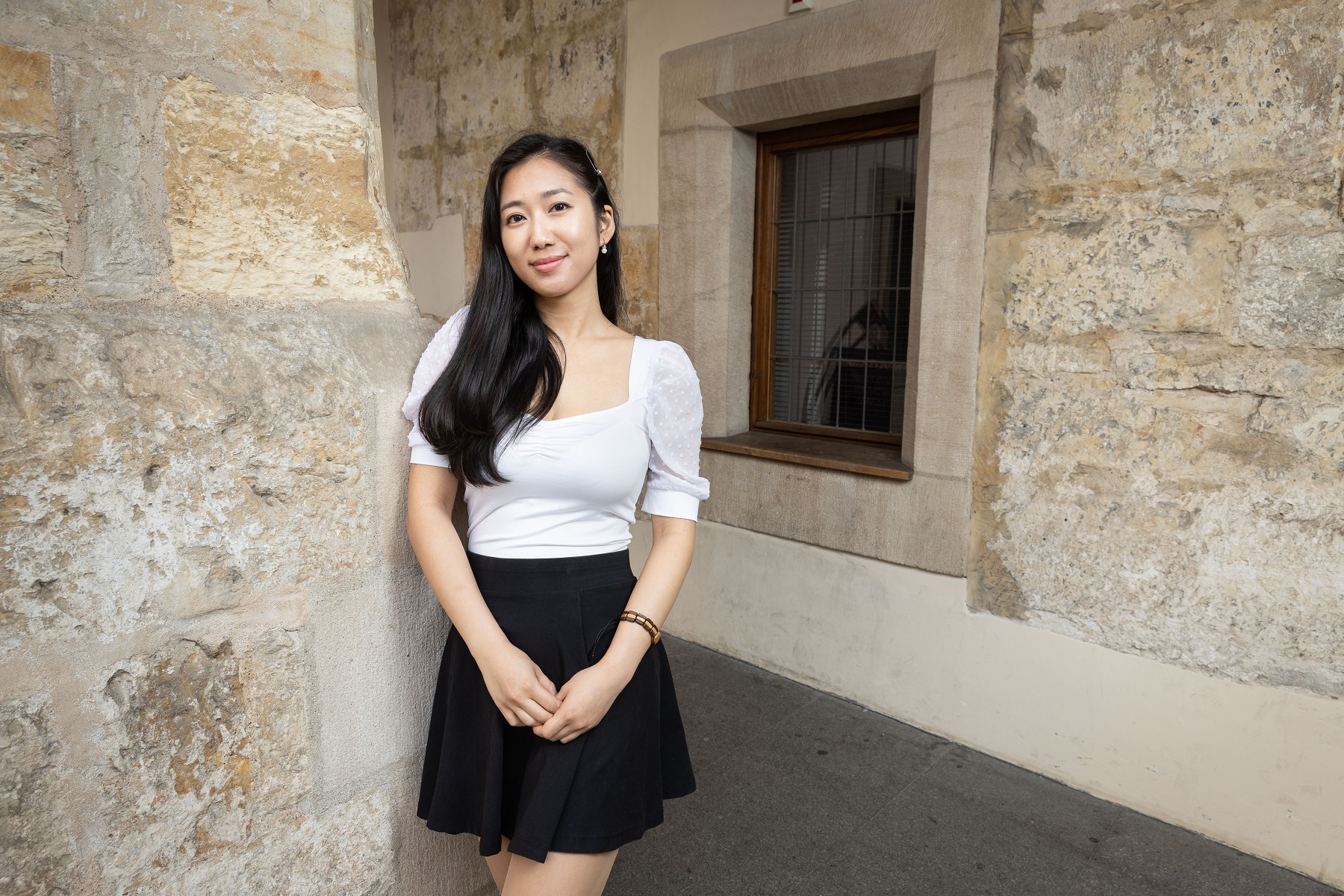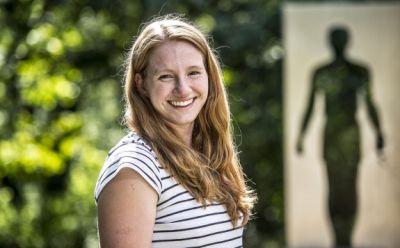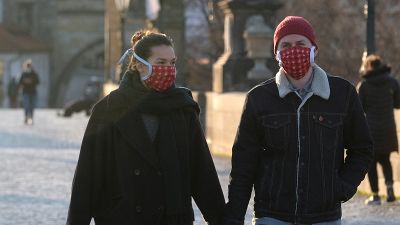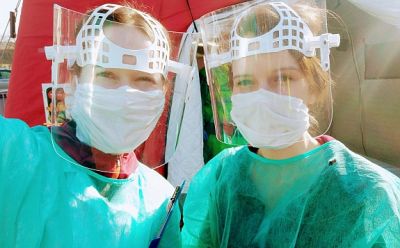“I want to be as productive and helpful within society as possible,” says Quynh Anh Vu, a Hanoi native and graduate of the Faculty of Pharmacy at Charles University. Quynh Anh received the Rector's Award for best science graduate in April. She is perfectly comfortable with the nickname of “banana child” as the Czechs call young second-generation Asians who have fully integrated into broader society. She speaks respectfully but openly about her parents, the Vietnamese community, and how to resist external pressure and remain true to herself.
How long have you lived in the Czech Republic?
Since I was five years old, so for 20 years. My father first came here in 1988. He still recalls how he was still shivering 14 days after arriving in Czechoslovakia, because the train journey from Vietnam took him a month. Every year he would come to Hanoi for a while. Mom got her visa before I did. After they left, I stayed in Hanoi for another year with my extended family and two older sisters. Then, when I was five, my grandfather put me on a plane and I flew to the Czech Republic. I lived with my parents in Mladá Boleslav until I moved to a dorm at Hradec Králové for my university studies.
Your sisters stayed in Vietnam?
Yes. They were fifteen years older than me, they were studying, they already had their background there, from which their parents did not want to uproot them. I live in the Czech Republic only with my mom and dad.
Are they happy here?
I'd say so. They came here to give me a better life than I would have today in Vietnam, and a better childhood than they had. They've been through war, they know what it's like to be poor what it is like going to bed on an empty stomach.
Do the sisters come here to see you?
They've never been here. Even for a one-time visit, you need a visa, and the Czech authorities refused them. They're of working age, officials are probably afraid they'd stay and wouldn’t want to return home.
Did your parents learn Czech?
Only a little, they only know the basics.
But they've lived here for 20+ years!
Their knowledge of Czech is basically the same as when they started. My dad worked at the Škoda automotive factory. Soon he started his own business, had a market stall. Gradually he saved up money and rented a small shop where he sold clothes and stuff. At that time, he brought my mother here and she helped him. Seven years ago they closed the shop, they weren't making much money anymore, they were getting close to retirement and they were getting tired. So they decided to quit and they went to work on the factory line at Skoda, where they still are.
How can they work if they don't speak Czech properly?
They have friends in the Vietnamese community and colleagues at work. I think they didn't improve because they relied on me to do everything for them. Which I still do, more or less. Even though I no longer live with them, I handle things for them over the phone. When I can, I go to bureaux with them in person when they need me to, just like I did when I was a kid. Quality of life-wise, they're happy because they have a really nice life here. But I think they miss their family. I'd say they sacrificed themselves for me, in quotes. They keep telling me they're going back to Vietnam in retirement. But I think it would be hard for them to leave me here on my own.
Do you feel like a banana baby?
I do, and I also call myself that.
Do you feel ‘different’ within Czech society?
The older I get, the less I think about it. And I find that I'm less and less likely to encounter any comments or stereotypical evaluations. But when I was a kid, I was aware of it a lot. Like, these overly positive expectations that, as a Vietnamese girl, I was certain to be good at math and all, I'll get straight A's all the time.
Do you recall any strong memories from your childhood that influenced you?
The most important one is my kindergarten teacher. I remember the very first day I walked in, and I didn’t know a single word in Czech. She took me under her wing and arranged with my parents that she could babysit me after kindergarten. Since I could already read from Vietnam, she brought me Czech children's books, we watched cartoons together, she took me to her house, on trips, she was very kind. Probably thanks to her, I learned Czech very quickly and soon I started to feel at home here. I'm grateful to her for giving me a typical Czech childhood. At Christmas and Easter, she did traditional activities with me like painting eggs or decorating the tree. She was incredible.
My parents and I adopted some of the local traditions. We give each other presents at Christmas, but we don't have a typical Christmas Eve meal. We eat carp all year round, unlike the Czechs. I have tried to cook Czech food for my parents, but they are not interested. Not that they don't like it, but they are used to their lighter diet. They just prefer rice. I personally try to take the best of both cuisines. Once in a while I go to SAPA (Prague’s authentic Vietnamese market) for herbs and exotic sauces, but otherwise I shop at the supermarket.
Do you follow any traditions that come from Vietnamese culture?
It seems to me that in general Vietnamese people have more respect for their parents and elderly people. It shows in the little things. For example, before a meal together, the youngest member of the family sets the table, invites the others to join him, wishes them well and invites them to eat first. Dinner is a really important parr of the day for us. Because we only eat with three of us here, it's not as noticeable, but when I was visiting relatives in Vietnam for a month eight years ago, a large family of almost 40, as one of the youngest members, I was very aware of the respect for elders. And in turn, I was touched and surprised by how warmly they treated me, as if I hadn't left at all those years ago.
Here in the Czech Republic - with parents who don't speak Czech - you had to be on your own a lot.
Yes, but it was great training for life. Since I was a little girl I went with them to bureaux and to the doctor, I don’t get thrown off by having to fill in a form. But I remember well how I struggled with it at first, it was difficult to get into it. Imagine going to first grade and reading the word “penále” or penalty for an overdue payment on an official document. I imagined a pencil case [pencil case in Czech is the similar-sounding penál – ed. note].
What did you like about school?
Everything. I ended up majoring in science, but I can't say I was much closer to science than anything else. I love literature, music, I love to sing, I was in the art and music club.
You must have been an amazing child.
Interestingly, my parents never praised me much. It wasn't until now, the first time they were at my Master's graduation, that I saw how proud they were of me, and they've been praising me ever since. I asked them why they didn't do it sooner. They said they were afraid of me being cocky, and they didn't want to jinx things.
Did you feel pressure from them to be successful when they left home for you?
Not from my parents. They even told me several times that they didn't care if I worked on a factory line or in an office somewhere. What matters to them is that I be a decent person who will contribute to this society in some way.
I felt pressure from the Vietnamese community. My parents' friends had children, older than me, who went to a multi-year high school. They expected, and often talked about it, that I would follow the same path. It was similar when we would go to SAPA and my parents would talk about me with other Vietnamese people there. My dad and mom didn't care at all, but the Vietnamese community couldn't understand why I didn't want to go to a six or eight year high school. They felt bad that I wasn't taking advantage of all the opportunities to have the best education. I felt more pressure when I applied to university. Most Vietnamese choose economics majors, and I was the only one from Mlada Boleslav who applied for science.
Why do you think it is?
I was discouraged that it would be very difficult, that it would be impossible to graduate, and if I succeeded, I wouldn't have much money. It seems to me that Vietnamese people think very practically and rationally in this regard - to have a degree in some not-so-demanding field that will allow them the highest possible financial reward. Going after your dream is not really their thing.
You graduated from the Faculty of Pharmacy at Hradec Králové at Charles University, but not in the classical field of pharmacy, but in laboratory diagnostics in healthcare. Was that your dream: to conduct experiments?
Absolutely. Most of all, I enjoyed chemical experiments in primary school. Gradually, I came to the conclusion that I wanted to do something related to biology and chemistry and help people at the same time. After graduation, I applied to medical school, the University of Science and Technology, and laboratory diagnostics in the health sector. I got in everywhere, but I was really most attracted to working in a lab.

In April, Quynh Anh Vu received the Jaroslav Heyrovský Award for the best graduates of science programmes from Vice-Rector Jan Kuklík.
The first year was tough. First time on campus, away from my parents, the stress of studying. But luckily, I really enjoyed it. Even though there was a lot to manage, it was a healthy kind of stress. And by sophomore year, it was totally great.
You got your Master's degree, your thesis was proposed for rigor, so you became a Ph.D. in science shortly after that.
I was able to defend my thesis with an A, and because my supervisor and my opponent had suggested my thesis for rigor, I was able to take the rigor examination. Last April I finished my thesis, defended it at the beginning of June, and in September I passed the exam, thus obtaining the degree of RNDr. or Doctor of Natural Sciences.
What did you do in your research?
My task was to synthesize new compounds that could theoretically be used as a drug. Specifically, in my undergraduate thesis, I was involved in the synthesis of acetylcholinesterase and butyrylcholinesterase inhibitors, which are enzymes found in the human body. They have the task of degrading (breaking down) acetylcholine - a neurotransmitter acting in the nervous system, thanks to which nervous excitations are transmitted. Acetylcholine sits on a receptor, and as soon as a nerve impulse occurs, the generation of a new impulse, it must be degraded. And it's this degradation that the two enzymes mentioned above provide.
In people who suffer from Alzheimer's disease, the activity of these enzymes is too high, so that acetylcholine is degraded before it is used for a nerve impulse. Because of the loss of acetylcholine and its deficiency in the body, cognitive dysfunctions then occur - patients suffer from speech or movement disorders. As part of my bachelor's thesis and then my master's thesis, I tried to create compounds that could inhibit acetylcholinesterase and thus could be used for the treatment of Alzheimer's disease. In my thesis, I also extended this issue by another aspect - I investigated whether this compound also showed antimicrobial activity against the bacterium that causes tuberculosis and could thus be used in the treatment of this infectious disease.
Why didn’t you continue your studies, to become a medical doctor?
It was a difficult decision for me. I was extremely interested in the research I was working on as part of my thesis, but I was also attracted to the medical field. During my Master's I was earning extra money as a health laboratory technician, and I decided to continue with that.
In the end, everything came together beautifully. I am working at the Department of Immunology and Microbiology at the General University Hospital, where I am currently completing a specialisation programme in microbiology, which is a kind of certification for non-medical doctors, so that in the future I won't have to work under professional supervision and can publish and interpret my results myself. The head of the institute, Professor Libuše Kolářová, also gave me the opportunity to do research. I have a small part-time job at the First Medical Faculty of Charles University, where I teach parasitology and I am also part of a research team that is developing PCR methods to diagnose parasites.
It's amazing how much you manage and how relaxed you are about it all.
I feel incredibly comfortable with it all. It makes me happy to be productive. Now I've discovered that I enjoy teaching as well, which I never would have thought of before. I've always considered myself more of an introvert, which is why the lab was so close to my heart. It makes me happy to see that students enjoy working with me as well. In preparation for teaching, I reminisce a lot about my studies, what I was interested in, who was a quality tutor for me. I try to create a pleasant atmosphere. I know how stressed I was myself about the authority of the lecturer, and I don't want the students to perceive me that way and be afraid to ask anything. They're studious, inquisitive. I ask them a lot, and when they answer correctly and I praise them, I can see how excited they are. It makes sense to me and to them. Overall, I think I'm exactly where I want to be in life right now.
| Doctor of Natural Sciences Quynh Anh Vu |
| Originally from Hanoi, Vietnam, she has lived in the Czech Republic since she was five years old. Last year, she completed her studies in Laboratory Diagnostics in Healthcare at the Faculty of Pharmacy in Hradec králové at Charles University. In April this year, she received the Jaroslav Heyrovský Award for the best graduate in natural sciences. Now she works at the Institute of Immunology and Microbiology of the 1st Faculty of Medicine and General University Hospital. She is preparing for certification in microbiology and works part-time at the First Faculty of Medicine of Charles University, where she teaches parasitology and participates in research. |






















